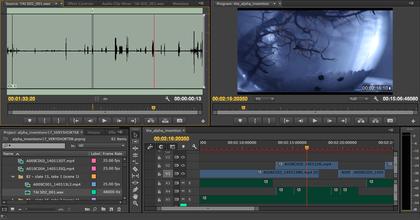 Editing in Adobe Premiere Pro CC.
Editing in Adobe Premiere Pro CC. The dust has settled, the adrenaline has subsided (for the time being) and I have spent most evenings of the last month clicking away on my laptop to put together the edit of The Alpha Invention.
They say that to be a decent editor you have to be able to "kill your babies" meaning that you cut out lines, sequences or, on feature films, entire scenes that you love for the benefit of the overall film. I've never completely understood the phrase because from my experience editors are more than willing to kill your babies, as opposed to their own. They didn't spend hours on set getting that line, they didn't write forty-nine drafts of a screenplay. This is precisely why many people prefer to hire an editor because they have that distance from the project and can see the film for what it really is and can be.
But I like to edit myself. It gives me that final draft of the film and crafting your shots into a story is one of the most exciting parts of the filmmaking process. However, I allow myself to do this based on one oath - if I see a baby, that is not standing in line with the rest of them, one that is taking the flow and tempo of the film off on a tangent and/or being a very sneaky troublemaker... then I will most definitely kill it. In cold blood. Please don't quote this out of context.
There are two occasions where I've had to kill a big baby with The Alpha Invention. Two sections of the script which I dearly loved, and they worked well on the page, but they weren't driving the story forward. Someone (I think it was Alfonso Cuarón) once said that film has more in common with music than it does with literature, I agree and I think it's because (again, this may have been Cuarón's explanation which I'm subconsciously stealing) they are both temporal; i.e. they pull you along in real time and you don't have a choice in the matter, whereas a reader can read at whatever pace suits them.
For this reason some things just do not work on the screen like they do on the page and these two sections, when watching the assembly edit, felt like an extended guitar solo when you're aching to get back to the chorus. At that point you start getting the voice in your head pleading for these young whipper-snapper's lives with excuses ranging from the almost-convincing - "It's something audiences will remember once they leave the cinema, a nice little detail," - to the very-naff - "But you love the work of [insert director who often makes 3 hour movies]!" Yeah, but I didn't see what prevented it from being a five hour one.
So I downed a beer, gave those sections one last look ("Un momento, doctor,") and then introduced them to the cold edge of my digital scissors. Sadly. But now when you watch the film it whips along and feels in time, in tune and impactful!
Talking about impact. Soon we'll have a locked edit and then it's onto music composition! MT
They say that to be a decent editor you have to be able to "kill your babies" meaning that you cut out lines, sequences or, on feature films, entire scenes that you love for the benefit of the overall film. I've never completely understood the phrase because from my experience editors are more than willing to kill your babies, as opposed to their own. They didn't spend hours on set getting that line, they didn't write forty-nine drafts of a screenplay. This is precisely why many people prefer to hire an editor because they have that distance from the project and can see the film for what it really is and can be.
But I like to edit myself. It gives me that final draft of the film and crafting your shots into a story is one of the most exciting parts of the filmmaking process. However, I allow myself to do this based on one oath - if I see a baby, that is not standing in line with the rest of them, one that is taking the flow and tempo of the film off on a tangent and/or being a very sneaky troublemaker... then I will most definitely kill it. In cold blood. Please don't quote this out of context.
There are two occasions where I've had to kill a big baby with The Alpha Invention. Two sections of the script which I dearly loved, and they worked well on the page, but they weren't driving the story forward. Someone (I think it was Alfonso Cuarón) once said that film has more in common with music than it does with literature, I agree and I think it's because (again, this may have been Cuarón's explanation which I'm subconsciously stealing) they are both temporal; i.e. they pull you along in real time and you don't have a choice in the matter, whereas a reader can read at whatever pace suits them.
For this reason some things just do not work on the screen like they do on the page and these two sections, when watching the assembly edit, felt like an extended guitar solo when you're aching to get back to the chorus. At that point you start getting the voice in your head pleading for these young whipper-snapper's lives with excuses ranging from the almost-convincing - "It's something audiences will remember once they leave the cinema, a nice little detail," - to the very-naff - "But you love the work of [insert director who often makes 3 hour movies]!" Yeah, but I didn't see what prevented it from being a five hour one.
So I downed a beer, gave those sections one last look ("Un momento, doctor,") and then introduced them to the cold edge of my digital scissors. Sadly. But now when you watch the film it whips along and feels in time, in tune and impactful!
Talking about impact. Soon we'll have a locked edit and then it's onto music composition! MT

 RSS Feed
RSS Feed
